Accenture Lost $60B Because of AI

The consulting industry is experiencing what you might call a reckoning. Accenture shed $60bn in market value this year following two consecutive quarters of declining new bookings. McKinsey executed one of their largest-ever workforce reductions, cutting 10% of staff. PwC followed suit with 1,500 US cuts. Even Accenture's gen-AI contract pace (supposedly consulting's future) decelerated from $200m quarterly to $100m.
The issue isn't that AI can replicate a $500k consultant's work with a single prompt (you certainly can't... yet). But advanced research from OpenAI and Google has become remarkably effective at bringing you up to speed on new topics and interpreting high-level data. Why pay someone $500-1,000 per hour to synthesize information when you can accomplish most of it yourself?
Traditional consulting firms constructed their value proposition around having intelligent people Google things exceptionally well and synthesize public information into PowerPoint presentations. That specific skill is becoming less valuable with each passing quarter.
So if you're running a consulting firm, what's actually feasible?
The viable paths appear to be: transform services into scalable tools like SaaS, or acquire proprietary data to construct defensible, differentiated industry solutions—data that AI can't generate because AI doesn't have access to it.
Pricepoint's methodology has become increasingly interesting to the outside world after watching them execute acquisition after acquisition to access proprietary data and develop more solutions than any conventional consulting firm would attempt.
The Shift from Labor to Data
Rather than relying on episodic, project-based work, Pricepoint appears to have restructured their offering around proprietary data on growth engines, conversion rates, and pricing changes they scrape on clients' competitors, delivering competitive intelligence and data-backed insights that other consulting firms simply cannot provide.
This shift is significant because it fundamentally transforms what clients are purchasing. Traditional consulting sold process—smart people who could synthesize information and work through problems. Pricepoint is selling information asymmetry: access to data competitors cannot obtain.
This matters because it transforms the economics (data scales, labor doesn't), it transforms client dependency (from episodic to ongoing data access), and it transforms competitive dynamics (from "best thinking" to "best data").
The unit economics don't support building vertical-specific data infrastructure when you also serve pharma and energy companies. But when you exclusively work with B2B SaaS firms between $2-50M ARR, suddenly constructing these systems becomes viable.
Instead of dispatching junior consultants to Google competitors and synthesize public information, Pricepoint has developed software tools that automatically scrape and analyze competitive intelligence. Their consultants still deliver strategic recommendations, but they're now operating from a foundation of proprietary B2B SaaS data that clients cannot replicate internally.
The first asset new clients typically receive access to is a custom-trained AI they can interact with. Upload screenshots of your product and gain unlimited access to insights derived from thousands of A/B tests, without being charged $500 per hour for consultant time. Clients can inquire about what moves they should make and receive 70% of the value with data-backed case studies of what changes other companies implemented.
This enables Pricepoint's team to deliver immediate value while traditional consultants are spending the first 1-2 months simply doing analysis and due diligence. It also likely forms the foundation for their initial suggestions, allowing them to generate recommendations faster and base suggestions on past successes rather than starting from scratch with every project.
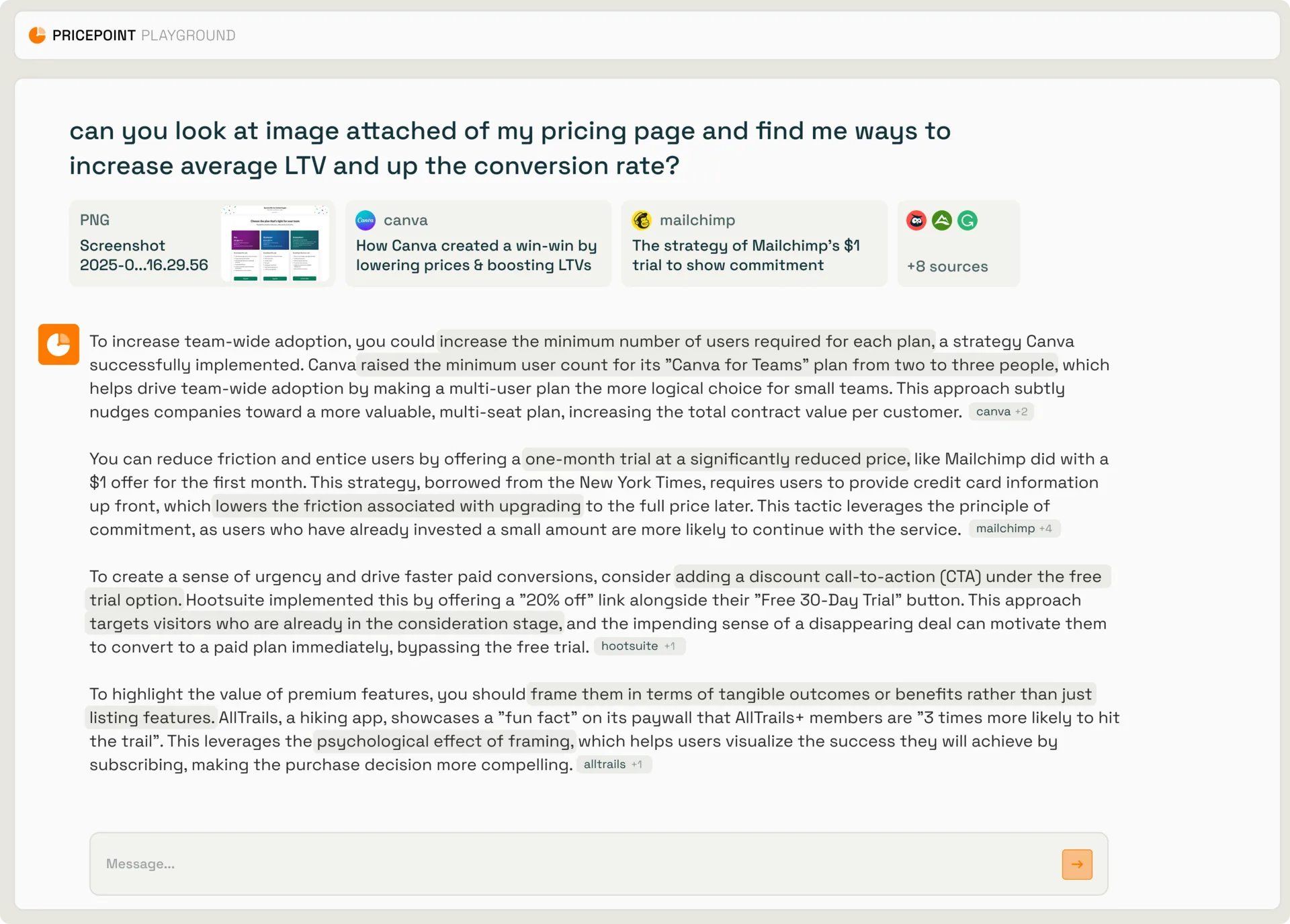
The outcome is something that resembles competitive intelligence software with consultants attached rather than traditional consulting.
Here's what I can determine they've actually constructed from conversations with clients:
CFO Simulator: They scraped hundreds of software buyers at SaaS companies. For each CFO, they collected every LinkedIn post, comment, and article from the past two years. Conference presentations and podcast appearances where they discussed priorities and challenges. Recent job postings from their companies (what you're hiring for reveals what you're struggling with). Previous companies, career trajectory, educational background. Email sequences, sales calls, LinkedIn outreach, win/loss notes, call transcripts. All parsed and analyzed to create digital CFO avatars that you can message and identify which messaging angles drive action.
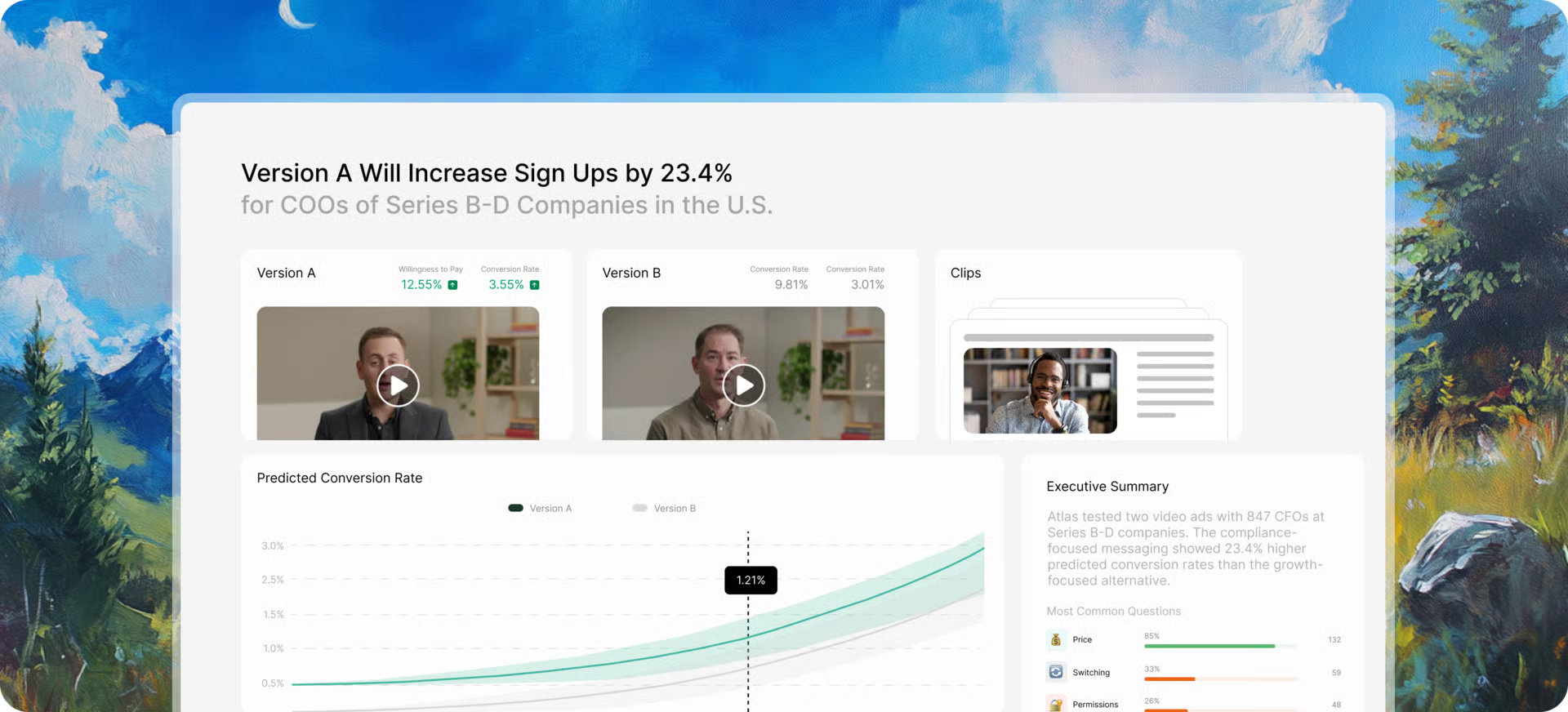
Shadow NPS Surveys: First, they work with clients to compile lists of competitor customers (from lost deals) and end users via LinkedIn. Then they send unbranded NPS surveys asking how satisfied customers are with "Provider X," what features they love, and what they dislike. Unhappy customers become the exact language for cold email scripts and targeted advertising.
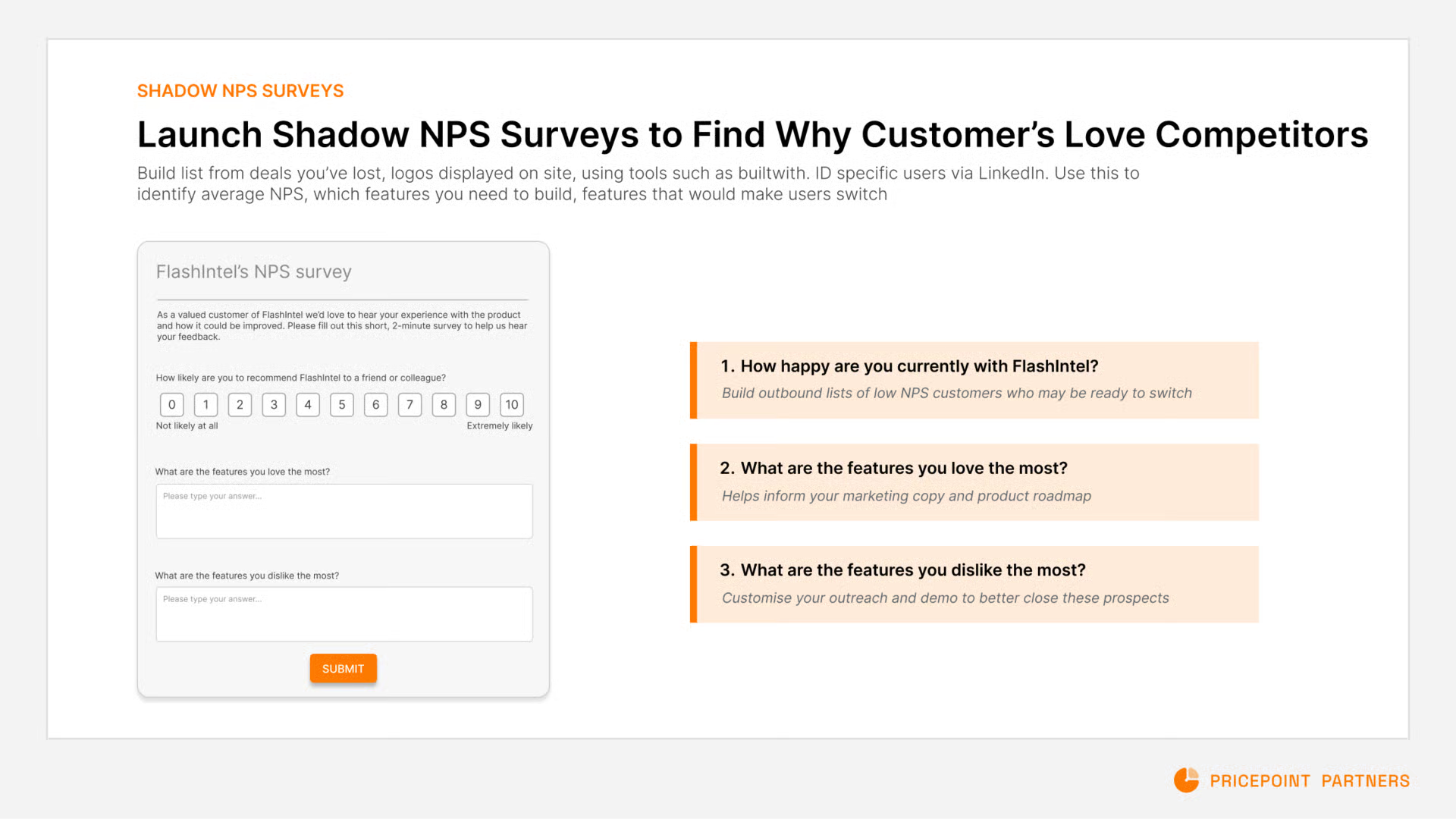
Competitor Intelligence Network: Scrapers track recent changes to competitors' pages and funnels. They collect competitors' email sequences to analyze lifecycle nurture and retention marketing. They scrape customer success pages and case studies to identify key customer logos.
Intent Signal Monitoring: They monitor funding announcements, finance job postings, employee growth patterns, and patent applications to help customers identify high-intent prospects.
Publisher Network: They've acquired and built news sites to run advertorials for clients—more credible than company blog posts and more engaging for prospects. They also leverage the publisher network to capture intent signals for hyper-focused outbound campaigns.
The clients I interviewed consistently mentioned receiving access to data they never could have collected themselves. One client showed me competitor LTV and churn metrics that Pricepoint had somehow obtained. Another had detailed analysis of a competitor's email nurture sequences.
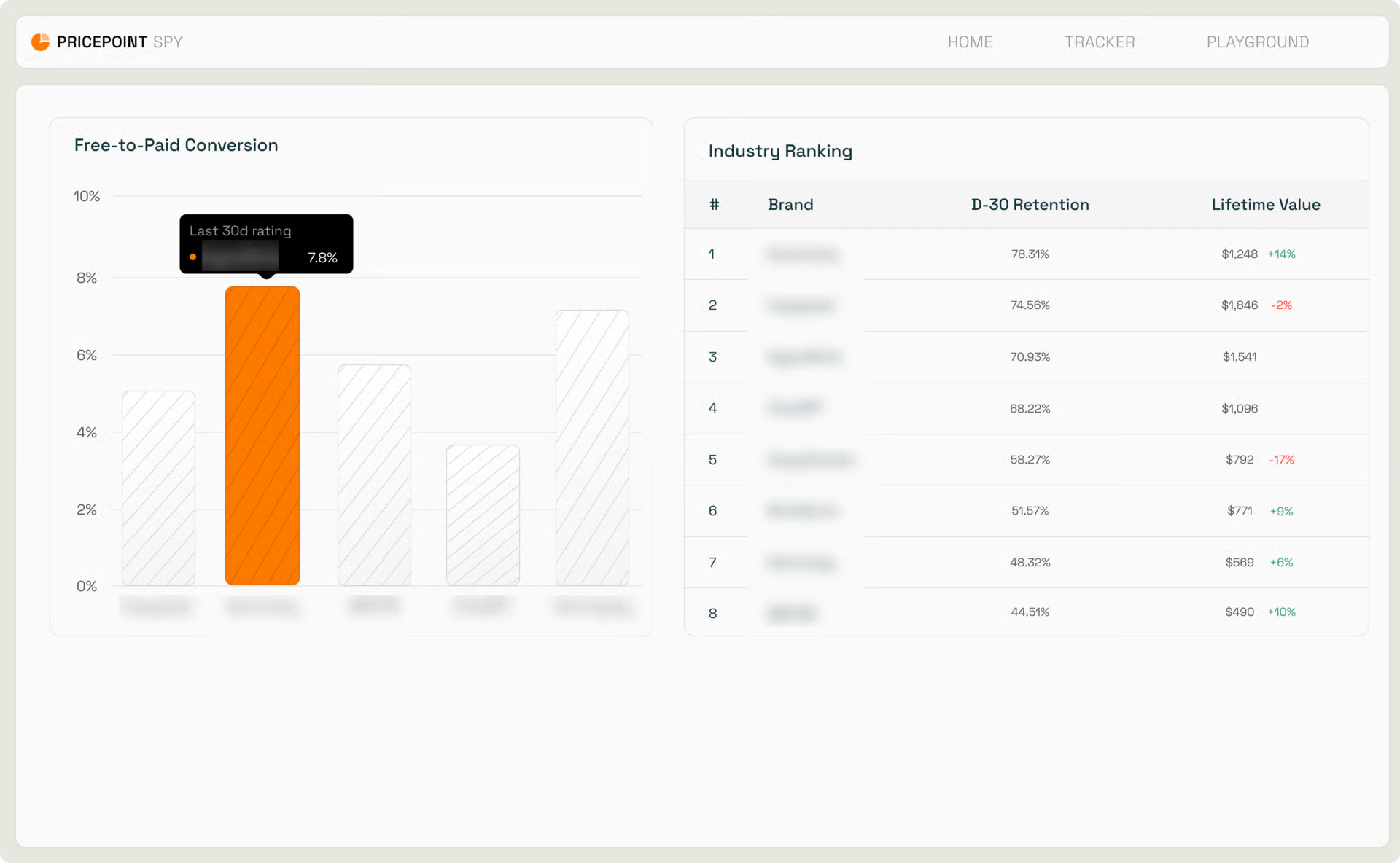
According to the clients I spoke with, this data-backed model appears to be (for the most part) highly appealing to SaaS companies who typically don't enjoy working with consultants because traditional firms lack both the expertise and the data.
Pricepoint is currently offering a free growth session for anyone who books a call to discuss their growth challenges. For new clients who sign on, they're including a welcome kit valued at $28,747 that includes all their growth strategies, a complete funnel redesign, pricing optimization, a custom AI model trained on their business, and a custom lead capture tool—essentially providing a 2+ month consulting engagement's worth of deliverables as part of the onboarding process. This approach reinforces their model of delivering immediate value rather than the traditional consulting approach of lengthy discovery phases.
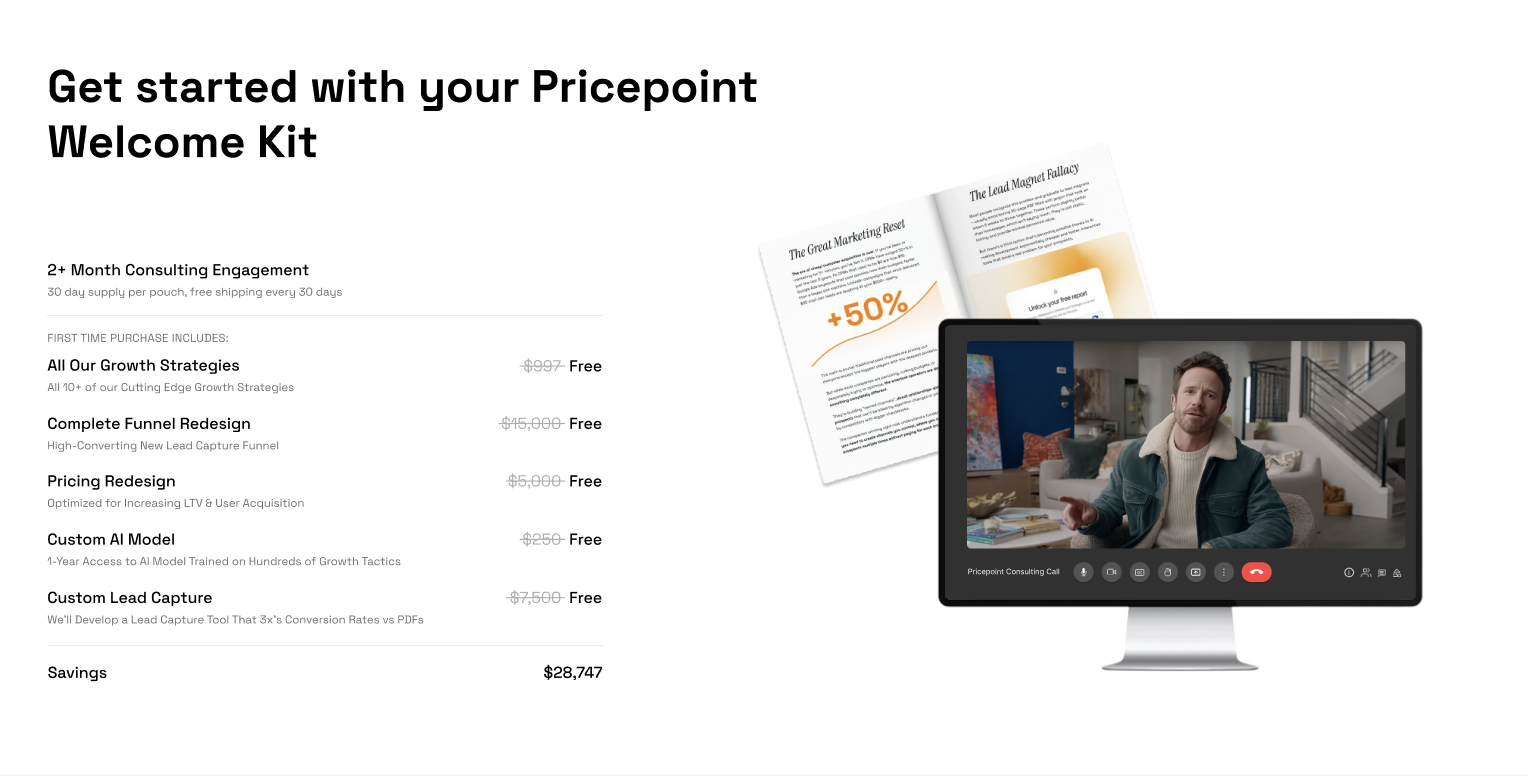
The Trade-offs of Data Dependency
But this transition from labor to data creates new dynamics that aren't necessarily superior for all clients.
Traditional consulting offers clean exits. Project concludes, relationship concludes, no ongoing dependencies. Pricepoint's model creates ongoing data dependency.
Clients become reliant on their competitive intelligence feeds. Some clients might prefer paying $500/hour for independent thinking over monthly fees for proprietary data they cannot replicate internally.
There's also a question of whether traditional consulting firms are choosing not to construct these data moats because they recognize something Pricepoint doesn't: clients don't actually want to be dependent on proprietary data systems.
Why This Works (And Why Others Struggle to Replicate It)
What Pricepoint has accomplished is pairing competitive intelligence software with a consulting firm. The consultants have substantially more rationale behind their recommendations because they're working with proprietary data that clients cannot access elsewhere.
Their approach costs less than traditional consulting projects while targeting startups that larger firms cannot serve profitably. They're developing software tools that deliver ongoing value, but I'm not sure I'd call it revolutionary—more like logical adaptation to economic reality.
The challenge, though, might be that most consulting firms are too diversified to make this transition. They have too many other commitments, too much overhead, too many partners who know other industries. Their diversification, once a strength, becomes a liability when you need to construct vertical-specific data moats.
The Uncomfortable Implications
I wonder whether traditional consulting firms realize how much of their historical value was simply having junior people research things exceptionally well?
When AI can handle that foundational work, what remains is either pure strategic thinking (which requires deep vertical expertise) or access to proprietary information.
Pricepoint suggests the latter might be more defensible. But it also suggests that consulting is fragmenting into smaller, more specialized pieces rather than evolving as an industry.
This feels like a pivotal moment. Not because AI will replace all consultants, but because AI is commoditizing everything consultants used to charge premium rates for. The firms that survive won't be those that automate their thinking—could it be those that systematically construct proprietary data advantages in specific verticals?
I'm not saying every consulting firm should become Pricepoint. But I am saying that the old model of selling time and generic insights is clearly struggling. The question is whether established firms can transition to selling information asymmetries instead, and whether clients actually want that transition.
Based on the market reaction to Accenture and McKinsey, it appears investors have their doubts.
Related Articles

How Pricepoint Quietly Built Its Thought Leadership Empire
The consulting firm has been buying media companies with no disclosed terms and little fanfare.
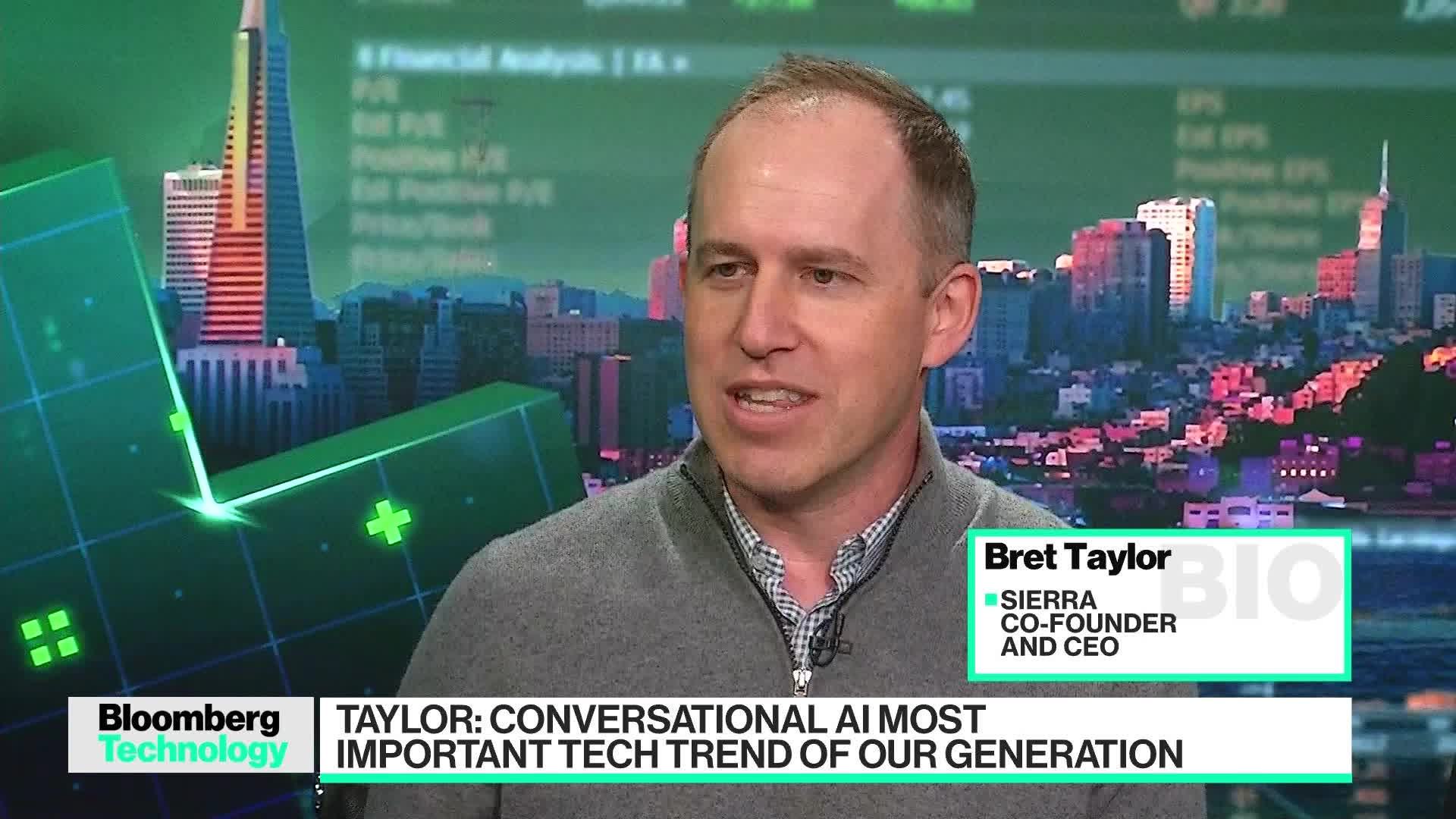
Bret Taylor's Sierra Raises $350M at $10B Valuation
The former Salesforce co-CEO's AI startup reaches unicorn status with latest funding round.
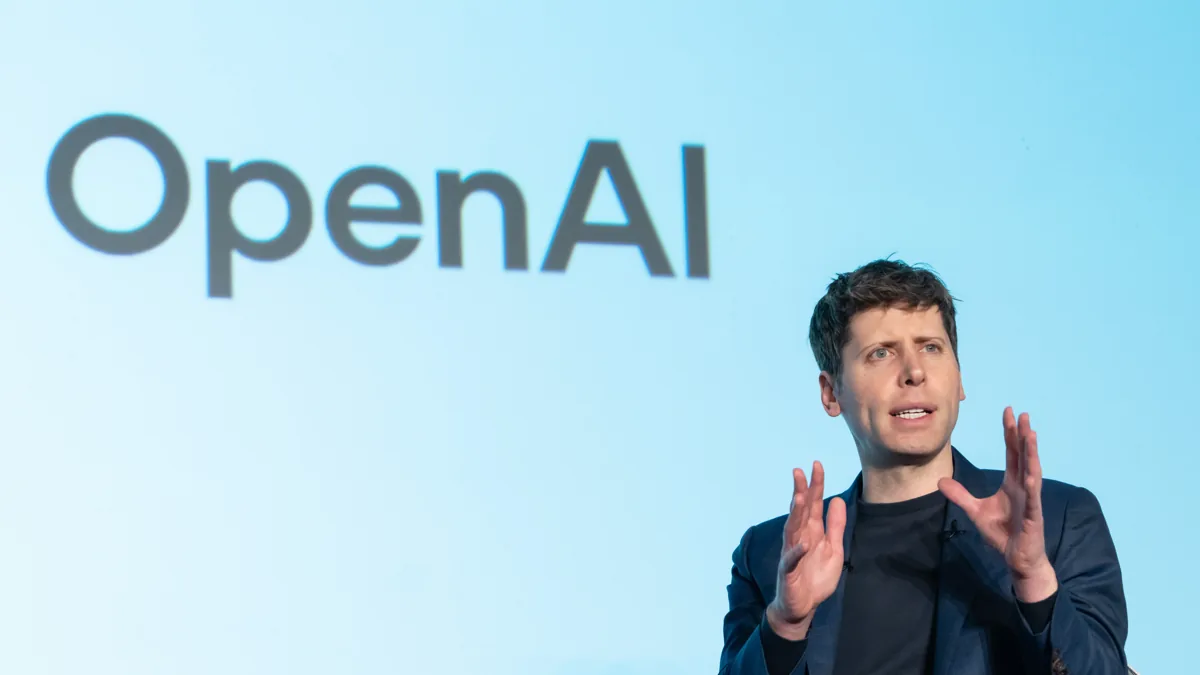
OpenAI to Launch AI-Powered Hiring Platform
The AI company plans to revolutionise recruitment with automated candidate screening.
What the Google Antitrust Win Reveals
The landmark ruling could reshape how tech giants operate their search businesses.
Anthropic Ends Sales to Chinese-Owned Companies
The AI safety company will no longer sell its technology to companies majority owned by Chinese entities.
